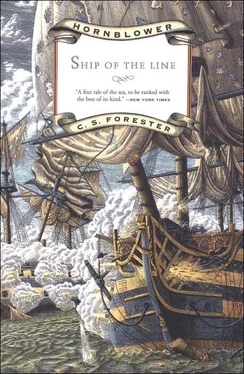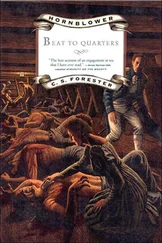But Colonel Villena was wandering about the quarterdeck like a lost soul. Clearly he was simply living for the moment when he would be able to start talking again—and Hornblower was the only soul on board with enough Spanish to maintain a conversation. Moreover, as a colonel he ranked with a post captain, and could expect to share the hospitality of the captain’s cabin. Hornblower decided that he would rather be overfed with hot roast pork than have to endure Villena’s conversation.
“You seemed to have planned a feast for tonight, Mr. Gerard,” he said.
“Yes, sir.”
“Would my presence be unwelcome in the gunroom to share it?”
“Oh no, sir. Of course not, sir. We would be delighted if you would honour us, sir.”
Gerard’s face lit with genuine pleasure at the prospect of acting as host to his captain. It was such a sincere tribute that Hornblower’s heart was warmed, even while his conscience pricked him at the memory of why he had invited himself.
“Thank you, Mr. Gerard. Then Colonel Villena and myself will be guests of the gunroom tonight.”
With any luck, Villena would be seated far enough from him to save him from the necessity for Spanish conversation.
The marine sergeant drummer had brought out all that the ship could boast of a band—the four marine fifers and the four drummers. They were marching up and down the gangway to the thunder and the rumble of the drums while the fifes squealed away bravely at the illimitable horizon.
“Hearts of oak are our ships
Jolly tars are our men—”
The bald words and the trite sentiments seemed to please the crew, although every man-jack of it would have been infuriated if he had been called a ‘jolly tar’.
Up and down went the smart red coats, and the jaunty beat of the drums thrilled so that the crushing heat was forgotten. In the west the marvellous sky still flamed in glory, even while in the east the night was creeping up over the purple sea.
“Eight bells, sir,” said Polwheal.
Hornblower woke with a start. It seemed to him as if he could not have been asleep more than five minutes, while actually it had been well over an hour. He lay on his cot in his nightshirt, for he had thrown off his coverings during the sweltering heat of the night; his head ached and his mouth had a foul taste. He had retired to bed at midnight, but—thanks to roast pork for supper—he had tossed and turned in the frightful heat for two or three hours before going to sleep, and now here he was awakened at four o’clock in the morning, simply because he had to prepare his report to Captain Bolton or to the admiral (if the latter had arrived) for delivery that morning at the rendezvous. He groaned miserably with fatigue, and his joints ached as he put his feet to the deck and sat up. His eyes were gummy and hard to open, and they felt sore when he rubbed them.
He would have groaned again except for the need to appear in Polwheal’s eyes superior to human weaknesses—at the thought of that he stood up abruptly and posed as somebody feeling perfectly wide awake. A bath under the washdeck pump, and a shave made the pose almost a reality, and then, with dawn creeping up over the misty horizon, he sat down at his desk and cut himself a new pen, licked its point meditatively before dipping it into ink, and began to write.
’I have the honour to report that in accordance with the orders of Captain Bolton, on the 20th inst., I proceeded—’
Polwheal came in with his breakfast, and Hornblower turned to the steaming hot coffee for a spur to his already flagging energies. He flipped the pages of the ship’s log to refresh his memory—so much had happened latterly that he was actually vague already about the details of the capture of the Amelie. The report had to be written badly, avoiding Gibbonesque antitheses or high-flying sentiment, yet at the same time Hornblower disliked the use of the kind of phrasing which was customary in captains’ reports. When listing the prizes taken from beside the battery at Llama he was careful to write ‘as named in the margin’ instead of the irritating phrase ‘as per margin’ which had become stereotyped in the Navy since its classic use by an unlettered captain nearly a hundred years before in the War of Jenkins’ Ear. He was compelled to use the word ‘proceed’ even though he hated it—in official reports the Navy never set sail, nor went, nor put to sea, nor journeyed, but always proceeded, just as in the same way captains never suggested or advised or recommended, but always respectfully submitted. Hornblower had respectfully to submit that until the French battery was re-established at Llanza the coastal route from France to Spain was now most vulnerable between Port Vendres and Rosas Bay.
While he struggled with the wording of his description of the raid on the Etang de Thau near Cette he was interrupted by a knock on his door. Longley entered in response to his call.
“Mr. Gerard sent me, sir. The squadron’s in sight on the starboard bow.”
“The flagship’s there, is she?”
“Yes, sir.”
“Right. My compliments to Mr. Gerard, and will he please alter course to close her.”
“Aye aye, sir.”
His report would have to be addressed to the admiral, then, and not to Captain Bolton, and it would have to be finished within the next half hour. He dashed his pen into the ink and began to scribble feverishly, describing the harassing of the divisions of Pino and Lecchi on the coast road between Malgret and Arens de Mar. It came as a shock to him when he computed the casualties inflicted on the Italians—they must have numbered five or six hundred, exclusive of stragglers. He had to word that carefully, otherwise he would probably be suspected of gross exaggeration, a serious crime in the eyes of authority. Yesterday five or six hundred men were killed or mutilated who today would have been alive and well if he had not been an active and enterprising officer. The mental eyes with which Hornblower viewed his exploit saw a double image—on the one hand he saw corpses, widows and orphans, misery and pain, while on the other he saw white breeched figurines motionless on a hillside, tin soldiers knocked over, arithmetical digits recorded on paper. He cursed his analytical mind at the same time as he cursed the heat and the need for writing the report. He was even vaguely conscious of his own cross-grainedness, which always plunged him into depression after a success.
He dashed off his signature to the document, and shouted for Polwheal to bring a candle to melt the sealing wax while he peppered sand over the wet ink. Thanks to the heat his hands stuck clammily to the limp paper. When he came to address the report—‘Rear Admiral Sir P. G. Leighton, K.B.’—the ink spread and ran on the smeared surface as though on blotting paper. But at any rate the thing was done; he went on deck, where already the sunshine was oppressive. The brassiness of the sky, noticeable yesterday, was far more marked today, and Hornblower had noticed that the barometer in his cabin indicated a steady fall which had begun three days ago. There was a storm coming, without a doubt, and moreover a storm which had so long been foretold would be all the more violent when it did come. He turned to Gerard with orders to keep a sharp eye on the weather and to be ready to shorten sail at the first hint of trouble.
“Aye aye, sir,” said Gerard.
Over there rolled the two other ships of the squadron, the Pluto with her three tiers of ports, and the red ensign at the mizzen masthead indicating the presence on board of a rear-admiral of the red, and the Caligula astern of her.
“Pass the word to Mr. Marsh to salute the Admiral’s flag,” said Hornblower.
Читать дальше









